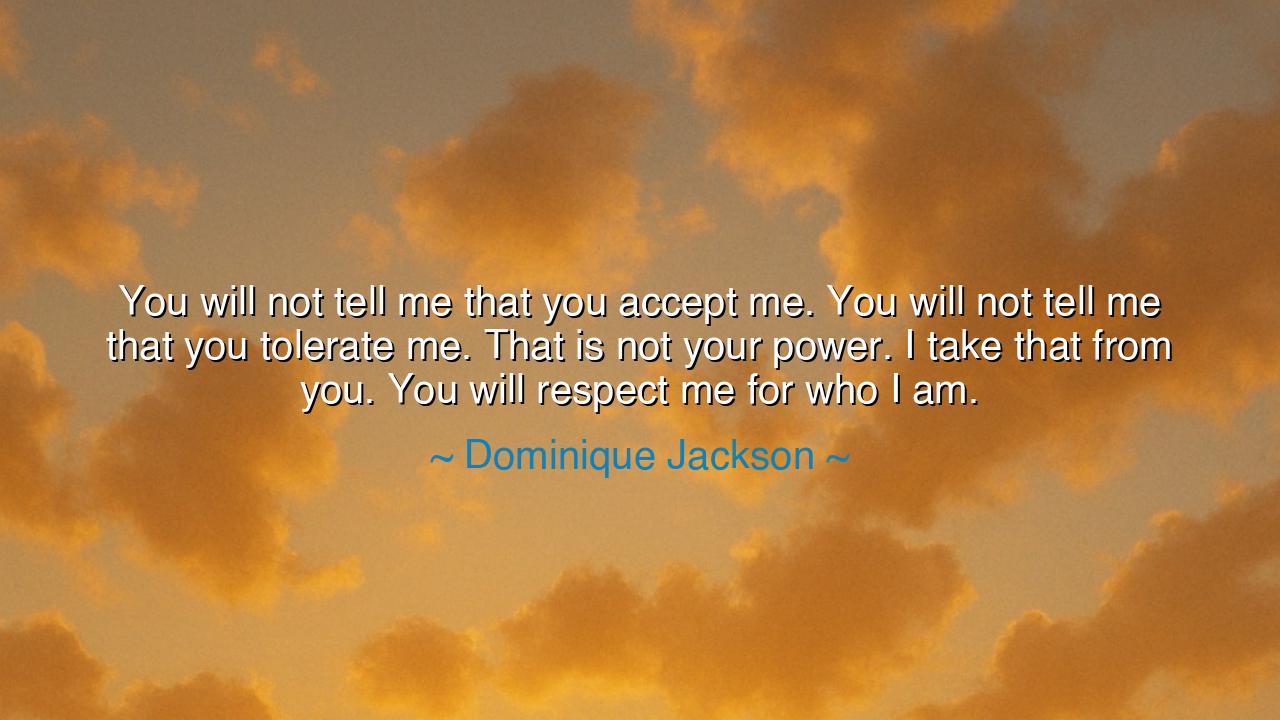
You will not tell me that you accept me. You will not tell me
You will not tell me that you accept me. You will not tell me that you tolerate me. That is not your power. I take that from you. You will respect me for who I am.






Dominique Jackson, a voice forged in the fire of struggle and triumph, spoke words that ring like a battle cry: “You will not tell me that you accept me. You will not tell me that you tolerate me. That is not your power. I take that from you. You will respect me for who I am.” These words are not whispered, but thundered, not a plea but a declaration. They remind us that human dignity is not granted by the permission of others, but claimed as an inherent right of existence.
To speak of acceptance or tolerance is often to speak from a place of power, as though one person held the authority to bestow legitimacy upon another. But Jackson’s wisdom pierces this illusion. She declares that identity and worth are not subject to the approval of others. The flame of selfhood does not beg for fuel; it burns because it must. In this, she echoes the voices of the ancients, who taught that the soul is sovereign, and no outside force can diminish its essence.
Respect—this is the demand, this is the truth. Not tolerance, which suggests endurance of difference. Not acceptance, which implies judgment passed by another. But respect, which recognizes the inherent worth that needs no validation. To respect is to bow before the divine spark in another human being, to see them not as lesser or other, but as equal, whole, and unshakably themselves. This is the foundation of justice and the seed of peace.
History bears witness to this truth. Think of Frederick Douglass, who was told by slaveholders that he was less than human, that his worth was theirs to define. But he refused their chains of definition, declaring instead his full humanity. His speeches, his writings, his very life proclaimed: “You will not tell me what I am. I will claim my dignity, and you will respect it.” In the same spirit, Jackson’s words are a continuation of this ancient lineage of defiance, a call for every marginalized soul to seize their own power.
To live in this way requires courage. For the world often seeks to silence, to categorize, to diminish. Yet Jackson’s declaration reveals a weapon stronger than oppression: the unyielding assertion of self-respect. When an individual claims their identity without apology, the world must eventually bow to the truth. Respect, once demanded with unwavering will, becomes not a gift received, but a recognition inevitable.
O children of tomorrow, hear this teaching: never place your worth in the hands of others. Do not wait for acceptance, do not settle for tolerance. Stand firm in the power of your being, and let the world know that you require respect. For when you live this way, you not only liberate yourself, but also blaze a trail for others who walk behind you, showing them that dignity is not granted—it is claimed.
The lesson is clear: claim your power. Speak your truth boldly. Do not shrink yourself to fit the narrowness of another’s vision. Walk in the fullness of who you are, and demand respect not with arrogance, but with the calm authority of one who knows their worth. In daily life, this means standing tall in your identity, calling out injustice, and honoring the dignity of others as fiercely as your own.
Thus let Jackson’s words live in your heart: “You will respect me for who I am.” Carry them as a shield when the world tries to diminish you, and as a torch to light the way for others. For the true power of life is not in being tolerated, but in being respected—and this power belongs not to those who would grant it, but to those who claim it with unshakable will.






AAdministratorAdministrator
Welcome, honored guests. Please leave a comment, we will respond soon